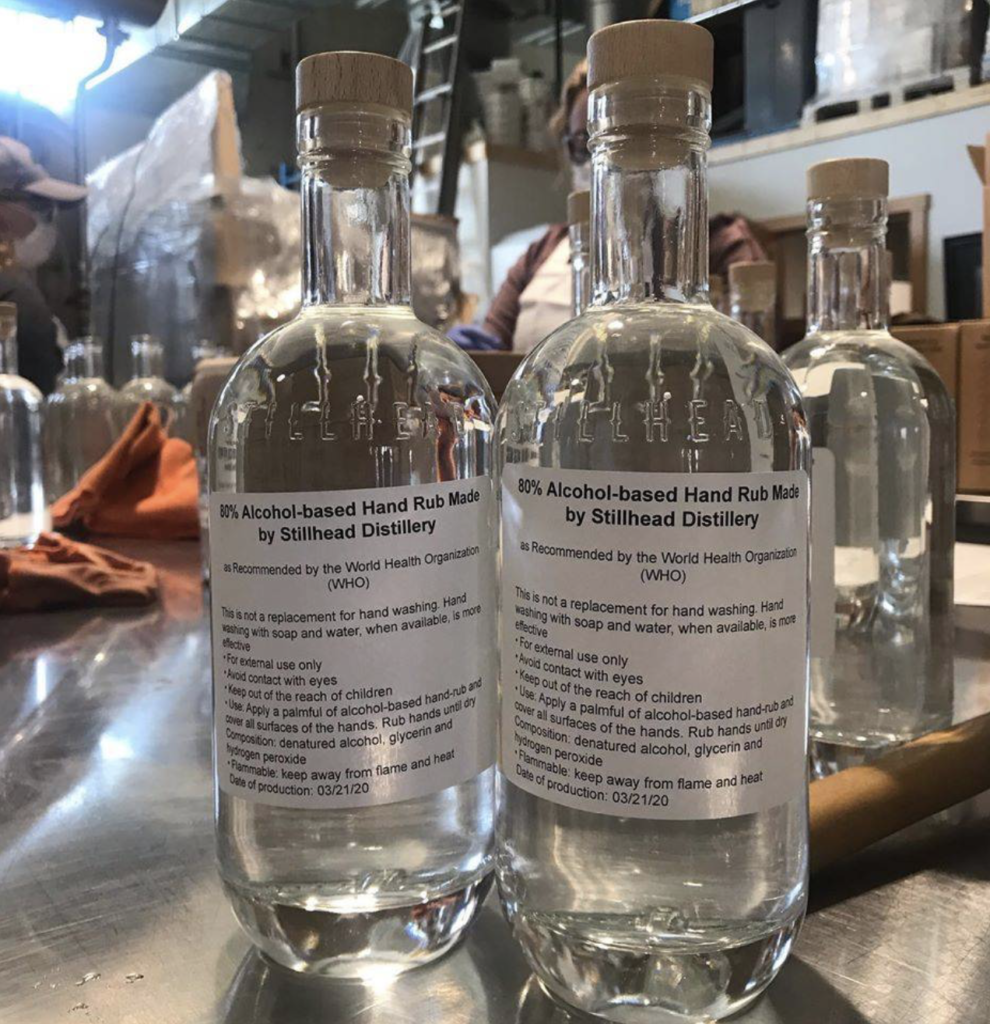Now is the Time for All Good Distilleries to Come to the Aid of Their Country*
Two Cowichan Valley distilleries — Ampersand and Stillhead — devised ingenious responses to the COVID-19 pandemic.
Cowichan Valley is a region around the Cowichan River, Cowichan Bay, and Cowichan Lake on Vancouver Island, British Columbia, Canada. Below is the verbatim article, by Kevin Rothbauer, that appeared March 24, 2020, in the online news publication, Cowichan Valley Citizen.
Distillers around the world take heed! You, too, can be hand sanitizer heroes!
Cowichan Valley distilleries help combat COVID-19 with hand sanitizer
Ampersand and Stillhead making hand sanitizer during shortage
By Kevin Rothbauer | March 24, 2020
© 2020, Cowichan Valley Citizen and Black Press Group Ltd.

80% Alcohol-based Hand Rub Made by Stillhead Distillelry. Photo ©2020 Cowichan Valley Citizen and Black Press Group Ltd.
Distillers in B.C. are now authorized to make hand sanitizer to help combat a worldwide shortage because of the COVID-19 pandemic, but operations in the Cowichan Valley had a jump on the announcement that was made on Sunday.
The Ampersand and Stillhead distilleries both started making hand sanitizer last week in their local facilities.
“There’s a certain amount of alcohol that’s not sellable, not drinkable,” Stillhead owner Brennan Colebank explained, adding that his operation has sufficient quantities of that product on hand.
Colebank himself was in 14-day isolation after returning from a vacation to California a few days earlier.
Stillhead’s plan was to give out sanitizer to health care workers, seniors, and other vulnerable individuals as soon as it could be bottled. The distillery announced on its Facebook page on Sunday that it had bottled and distributed 330 litres of sanitizer over the weekend.
Ampersand had started making sanitizer last Monday, and was able to donate some in bulk to community service workers and organizations by the middle of the week.
“We wanted to respond in the moment and act as quickly as we can,” Ampersand spokesperson Jessica Schacht said. “We’re trying to respond to that need as best we can.”
Both distilleries followed a recipe provided online by the World Health Organization. It requires at least 60 per cent alcohol, and photos of Stillhead’s sanitizer indicated that they used an 80 per cent formula.
For more information about acquiring sanitizer, Ampersand can be reached via Facebook and Instagram, where they are @ampdistillingco. Stillhead is @stillheaddistillery on both platforms.
*Trivia Note — by Nancy Upper
The sentence “Now is the time for all good men to come to the aid of the party” originated with the typewriter. In 1866, Christopher Latham Sholes (1819-1890) designed a machine to print page numbers in books, serial numbers on tickets, and numbers on other items. By September 1867, Sholes and his associates had developed a model with numbers, a full alphabet, and punctuation marks. Sholes suggested they call this machine a “typewriter.”
Charles Edward Weller (1840-1925), a long-term friend of Sholes and, in 1867, employed as a law stenographer, had followed with great interest the building of the typewriter from its inception to its completion. In his book, The Early History of the Typewriter (1918, p.27 in the eBook edition), Weller wrote:
We were then in the midst of an exciting political campaign [in Milwaukee, Wisconsin, autumn 1867], and it was then for the first time that the well known sentence was inaugurated, — “Now is the time for all good men to come to the aid of the party;” also the opening sentence of the Declaration of Independence “When in the course of human events,” etc., which sentences were repeated many times in order to test the speed of the machine.
Some typing instructors changed the finger exercise to “Now is the time for all good men to come to the aid of their party.” Or changed it to the less political “Now is the time for all good men to come to the aid of their country.”